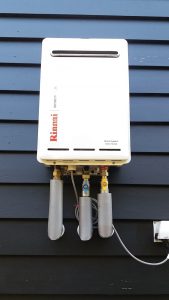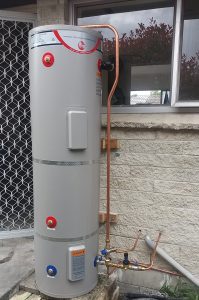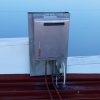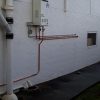Are You Confusing an Infinity With a Cylinder?
Every day, we at Water Heater Brokers get calls from people asking, “Do you have an infinity cylinder?” The quick and typical answer is, “Sorry, there may be a confusion.”
Why? Firstly, Rinnai is a brand, not a product. In the same way that a Jeep is not a vehicle type but a brand.
Secondly, you either need a Rinnai Infinity or a Hot Water Cylinder. These are two different products.
So, what makes them different? Let’s discuss.
What Is a Rinnai Infinity?
A Rinnai Infinity is an external instantaneous gas hot water heater that’s suitable for:
- External domestic applications;
- Low hot water demand applications (small apartments or homes); and
- Mains and low pressure systems.
You will need to treat hard or acidic water to use this product. It’s available for Natural Gas or LPG. You need to specify gas type at time of purchase.
The Infinity provides instant hot water and no storage. This makes it different from hot water cylinders.
What Is Continuous Flow?
It is exactly that – a continuous flow hot water system. Unlike storage tanks that can run
out, continuous flow units deliver a pre-determined flow rate every minute for as long as
the unit is running.
General Principle of Operation
Each Rinnai continuous flow water heater has a number of components that control the accuracy of the water temperature and the water flow:
– PCB (the on-board computer);
– water control valve;
– water flow sensor;
– modulating gas valve; and
– outlet water temperature sensor.
The unit senses the need to start when the water begins to flow through the appliance when a tap is turned on. The combustion fan starts, ignition begins with electronic requiring electricity, and the gas valve opens. Once the flame is established the appliance will heat the water as required until the tap is turned off.
The Difference Between Rinnai Infinity VT/HD and Rinnai EF
A Rinnai EF uses two heat exchangers to create continuous hot water on demand, the Rinnai Infinity VT/HD has only one.
How the Rinnai EF Operates:
- Water travels to the secondary latent heat exchanger first.
- Combustion gases condense outside the latent heat exchanger and heat is transferred to the cold water. The water temperature increases by approximately 5 °C.
- Water flows to the primary heat exchanger.
How Rinnai Infinity Works
The Rinnai Infinity heats water as it goes through the unit. So you only consume energy every time you turn on the tap. This makes the Rinnai Infinity a superbly energy-efficient system because it only heats water when needed. In turn, it lowers your running costs, as well as greenhouse gas emissions in your home.
The Rinnai Infinity, which is also called a tankless water heater, offers both advantages and disadvantages. You just have to weigh your options so you’ll be able to reap the benefits of your purchase in the long run.
Tankless Water Heater Advantages
Tankless water heaters, also known as instant water heaters or “on demand” units consume 30 to 50 percent less energy than units with tanks. This saves you about $100 or more each year, depending on your total water consumption.
Tankless units heat water only when you turn on the tap. They usually run on propane or natural gas. The main benefit is they remove the extra cost of storing 40-50 gallons of water and keeping the hot water in a storage tank. This conserves energy for you so you waste less money in the long run.
They also provide continuous hot water supply. This is ideal for filling a big hot tub or whirlpool. Plus, they are more compact than the standard water heater as you can easily mount them on a wall.
Tankless Water Heater Disadvantages
The main disadvantage of “on demand” or instant hot water heaters is the upfront cost, which can be quite expensive.
Another disadvantage is that the smaller units that you usually see won’t create enough hot water to serve most homes. You can only use one faucet at a time. This can be a problem if you want to take a shower while your dishwasher is running. Sure, there are a few bigger units that can handle the demand of your whole family, but they are quite costly.
Finally, one more disadvantage is related to cost. You see, tankless units have high-powered burners with specific venting requirements. This includes a dedicated, sealed vent system, which needs installation done by professionals. Meanwhile, natural gas burners often require a bigger diameter gas pipe. This will add up to your initial installation cost.
Rinnai Infinity
What Is an Electric Hot Water Cylinder?
An electric hot water heater comes in many names. Some call it a hot water tank, a hot water storage tank, a hot water thermal storage unit, a heat storage tank, a thermal storage tank, or a hot water cylinder. Whatever you call it, you need an electric hot water heater for your home.
In New Zealand, the most commonly used type of water heating used are called electric hot water cylinders. The hot water cylinder uses an electric element stored in an insulated tank. This will heat your water according to a given temperature that you can set using a thermostat.
For more information, visit hot water cylinders explained.
Rheem Hot Water Cylinder
Infinity vs. Cylinder
Comparing these two is like comparing apples with oranges. They each have their own benefits and merits, as well as downsides. You will need to make a list of pros and cons for each and fill out that list based on your needs and requirements in your household.
Conclusion
Now that you know the difference between an infinity and a cylinder, I hope you will be guided in your next purchase. It helps to know what you need before you ask so you’ll get what you require and won’t get blindsided by pushy salespersons. Do your research and you’re bound to discover what you require from your water heating system and whether you need an infinity or a cylinder.





